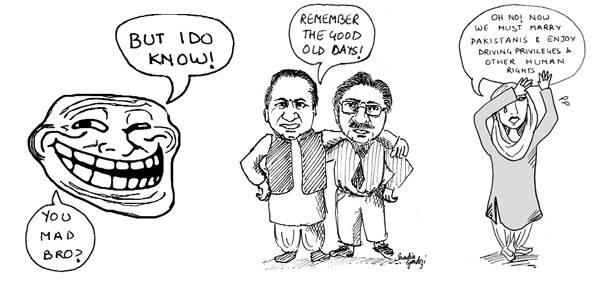
Unrequited love
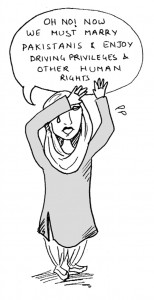
Sir,
According to reports published in the Saudi daily Makkah and the Morocco World News, a ban has been imposed on Saudi men marrying women from four countries namely Chad, Bangladesh, Pakistan and Myanmar. This report has been carried by a section of print media in Pakistan a well.
According to the report, quoting Makkah Police Director Major Gen Assaf Qureshi, requests by Saudi males for marriage with citizens of countries other than these four are also subject to strict procedures, and a written approval from any existing Saudi first wife has also been made mandatory.
While it is the right of any sovereign country to make family laws regarding intermarriages in their territorial jurisdiction, such discrimination is highly biased.
It is surprising that the Islamic Ideology Council and clerics in Pakistan who are so vocal in opposing Muslim Family Laws in Pakistan, which require the consent of first wife for remarriage, have chosen to stay silent on similar practices and even worse discriminatory sanctions against four specific countries in Saudi Arabia, which all of them look up to for guidance on religious issues and edicts or fatwas.
Ali Malik,
Lahore.
Wiseguys

Sir,
“Wisest, is he who knows he does not know,” said Socrates. In this one adage lies the key to understand the increasing stupidity in the social media.
Self proclaimed pundits in social media consider themselves to be experts in every available branch of human knowledge. They seem to have simply rejected the possibility that there might be things they don’t know about. A mere glance at social media would be suffice to make one realize that how much social media are saturated with such Mr Know-It-Alls.
When two or more of such self obsessed pundits enter into a debate, it does not take them long to shed their scholarly cloaks and resort to bad language. It is hard to decide whether one should laugh or weep at the arguments and debates of these illiterate experts. These self proclaimed scholars think that Googling a topic for an hour or watching a single program on cable TV makes them the authority on that subject. What they don’t realize is that knowledge and wisdom had never been so cheap and never will be.
It can be debated whether these Mr-Know-It-Alls are only present in the social media or a reflection of the whole society. But what can’t be argued against is the fact that this idiocy and fatuousness is not healthy for the intellectual growth of the society. This attitude not only harms our ability to learn and gather more knowledge but also undermines the value of true scholars and experts.
Syed Usman Shah,
Lahore.
Batting first
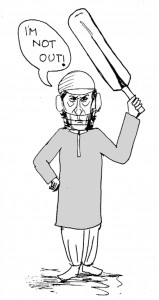
Sir,
Does Imran Khan take independent decisions? No he doesn’t. Yes, he is dictatorial in nature and adamant in instinct, yet happens to be superstitious in psyche. He has long been under the influence of spiritualists or mystics whom he had so far been following. Political wisdom does not recognize spiritual prediction. So Imran’s current move does not seem to be qualifying political wisdom but the very strong predictions made by a number of known mystics, spiritualists, occult experts, numerologists and palmists, whose foretelling has been appearing in the print and electronic media from time to time. The crux of their prediction was that till the end of October 2014, Nawaz Sharif shall remain in dire straits and Imran Khan has a big chance to grab this opportunity. Imran has himself spoken about nine-year cycles throughout his life and career.
Political wisdom would demand that he should not have disrupted peace on 14th August, that too when the country and its armed forces are fighting a decisive battle against terrorists. Religious cleric Tahirul Qadri has decided to carry out his own rally to Islamabad.
Leaders with mystic influence and decisions based on occult calendars who refuse to follow political wisdom often harm not only themselves, but also their party and their country.
Imran Khan’s game has started, but who will bat first? He himself? Qadri? Or the Chaudhrys?
FZ Khan,
Islamabad.
Catastrophe
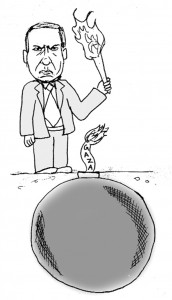
Sir,
Israeli forces have killed more than 1,600 Palestinians civilians to date. The calls of the world community to bring an immediate end to the unparalleled atrocities being committed by the Israeli forces in Gaza have fallen on deaf ears. The US, the UN and other countries of the world that matter have bitterly failed in their endeavors to stop Israel’s brutalities.
Covertly backed by its allies, the audacious Israeli government led by Netanyahu has rejected the continuous UN Security Council appeals for truce out-and-out. In the midst of growing international calls for ending the brutalities and for bringing about an immediate ceasefire in Gaza, the obstinate and emboldened Israeli government continues to follow its hot pursuits and its jets, tanks and artillery continue to incessantly pound the Gaza strip.
Least bothered by the serious concerns expressed by the world community over Israel’s high-handedness, Israeli Prime Minister Benjamin Netanyahu unabashedly blamed Hamas for trying to “pile up the bodies” of his own people to generate sympathy. Earlier, in an interview with Brian Williams of NBC News, he said Israel had no choice but to defend itself. He further said that the Palestinian militants were to be blamed for the mounting civilian casualties.
To bring an end to the crisis that is deteriorating by the day and devouring hundreds of innocent souls every day, the international community, particularly the Muslim world, must make concerted efforts to bring about an immediate ceasefire between the two warring nations. The Human Rights Council of the United Nations and other international human rights organizations must also join hands with the world nations to bring a quick end to Israel’s offensive. If this is not done on war footings and if their efforts fail to see the light of the day, the devastation that has already been caused to Gaza by Israel could acquire catastrophic dimensions.
M Fazal Elahi,
Islamabad.
For the people
Sir,
It would have been far better if we could have celebrated our Independence Day on August 14 with some show of unity, faith and discipline, instead of choosing it as a day for politics of agitation.
For a government which has been in power for more than a year, the PML-N has failed to convince even those that voted for them that it has any intention to put in place a team of competent qualified specialists at the helm in fields of water & power, air and road transportation, the energy sector or various regulatory agencies to make any quantitative and qualitative changes to improve the lives of common citizens.
People did not elect them to help traders evade taxes or their cronies to end up getting contracts for large projects, while government hospitals and schools are neglected. It does not cost money to appoint the right man for the job, but it does lead to waste of already scarce financial resources and public outcry if cronies are selected, and it also provides an opportunity to political rivals to destabilize an elected government.
Nandipur Power project suffered delays and obstruction by the previous government, but its shutdown right after its inauguration points to criminal incompetence of those responsible and yet no heads have rolled. How can a change occur if those responsible for waste of public funded projects go unpunished? If PML-N had been seen to be delivering good governance, then neither Imran nor Qadri would pose any threat to them.
Pakistan today faces colossal problems because of years of neglect, incompetence, institutionalized corruption and plunder by elected and paid public servants, with absolutely no accountability. What Prime Minister Nawaz Sharif must realize is that the patience of masses driven to desperation through years of abuse, injustices and betrayal of electoral promises has run out. Given the gravity of the crisis, this makes it all the more important for the PML-N to put into place a team, not of cronies, but men with specialist qualifications in relevant fields, and the moral capability to make tough decisions.
Tariq Ali,
Lahore.
Method vs flare
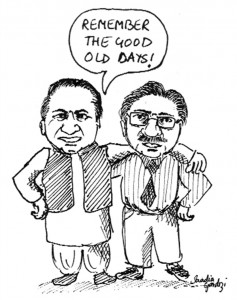
Sir,
The politics of agitation and protest going on in Pakistan reminded me of a world cup semi-final between Australia and Pakistan. The commentator’s words were reverberating in my ears. “Method verses flare.” The Pakistani nation is no doubt bursting with flare, ambition and enthusiasm, but the method it is acutely lacking in. At present there is a need to inculcate a methodical approach rather than being carried away with emotions. It would be not only in our individual interest but would also be good for collective welfare and a better image all over the world.
There is a debate going on in Pakistan about what the government should do in the present situation. Various solutions are being offered, such as that they should not take Tahirul Qadri lightly, or that they should approve of certain rightful demands of the PAT and the PTI. Now this word rightful is very interesting as, of course, these two parties must be discerning very clearly that all of their demands are genuine and indispensable.
Another point that is raised is that the lawyers’ movement became successful and the military ruler Pervez Musharraf had to accept their demands, hence gone are the times when the army’s support was needed to legitimize one’s stance. However, the lawyers’ movement was not as violent as Dr Tahirul Qadri’s movement might become.
Whatever the case is, the fact has to be acknowledged that the situation was greatly misjudged and mishandled by the government. The government espoused the notion that Tahirul Qadri will not be able to give a big jolt to the administration and the real task was to deal with Imran Khan and the workers only. But this assessment failed keeping in view the unease faced by the citizens of Lahore. The poor optics added fuel to the fire. And the situation will aggravate if state machinery is used to curb this wave of protests.
Another criticism of the government is about its reliance on political observers who were not well versed with dealing with such affairs in such times. Some people are of the view that Ghos Ali Shah and Sartaj Aziz would have been far better had they be given a chance to play in the political arena on stronger footings.
Does it all lead to the theory that Pakistanis cannot live in a democratic system? Or they only can be tamed by the army? If such a situation comes up, these divided political leaders should not blame anyone but themselves. It would essentially be their own doing. It is as if they are coercing the army to come and take over the administrative affairs of the government.
Shanzeh Iqbal,
Lahore.
The lottery
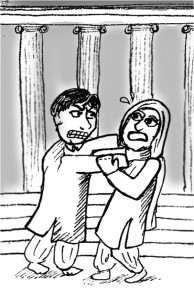
Sir,
In her famous story The Lottery, Shirley Jackson describes a small village buzzing with excitement. It’s time for the annual ritual of the lottery. A winner is picked each year in the village square, through drawing of names. Everyone is gathered to see who is honored this year. Celebrations are afoot and like all festivals children are the most excited. Adults, dutifully and unquestioningly carry out the routines as the age old tradition demands, as all traditions demand.
When someone suggests that some towns had already abandoned the tradition, Old Man Warner admonishes her. “Nothing but trouble in that,” he says. “Pack of young fools.”
Mrs Hutchinson is the lucky winner this year. With tears in her eyes, trembling, she comes forward and is greeted by the village elder. Eventually the villagers move away from her as she faces the crowd. “A stone hit her on the side of the head.”
“It isn’t fair, it isn’t right,” Mrs Hutchinson screams.
Every year, the lottery winner had the horrific fortune of being stoned to death.
In her powerful short story Shirley Jackson aptly describes the power and absurdity of tradition if followed ritualistically without thought.
One almost wonders if Ms Jackson had today’s Pakistan in her mind while writing the story. While there are no such annual rituals in Pakistan, tradition, culture and laws of the state allow for plenty of crimes that are as horrific. Inevitably women and minorities bear the brunt of these laws.
One such crime, illustrative of the problem, was committed a few weeks ago in front of the Lahore High Court.
Farzana Parveen had married someone she loved, against her parents’ wishes. She had arrived at the Lahore High Court to defend herself against the lawsuit her family had filed seeking to declare her marriage illegal. They caught up with her there, and killed her. An honor killing at the altar of justice had something ghastly and ironic about it. After all it is our traditions that make a certain type of murder a private affair. The incident had in it everything that is wrong with Pakistan – violence, a misogynistic mindset, disregard for law and order, apathy and a blind affinity for old ideas.
How will all this change? A radical departure from the existing mindset is required. How do we begin? I think the spark that could start the long and torturous process of changing cultural norms could begin with changing the laws that allow and encourage discrimination against women and minorities. In that sense, Pakistan is a case study of the lack of separation of religion and state – legislating morality through religious injunctions has not worked, and has caused divisions and confusions in the society.
A parliamentary debate on these issues would be a good start. A counter narrative grounded in a more open idea of tradition, culture and society is needed as an alternative to the prevailing discourse. It would also be refreshing to hear social issues being debated on TV talk shows, instead of endless chatter on politics. Politics without ethics can become a vicious game of survival, as is perhaps evident in Pakistan, and does not hold any long term benefits for society at large.
And the belief that tradition and culture can never change is false. They must evolve and adapt.
Naveed Ashraf,
Washington, D.C.

